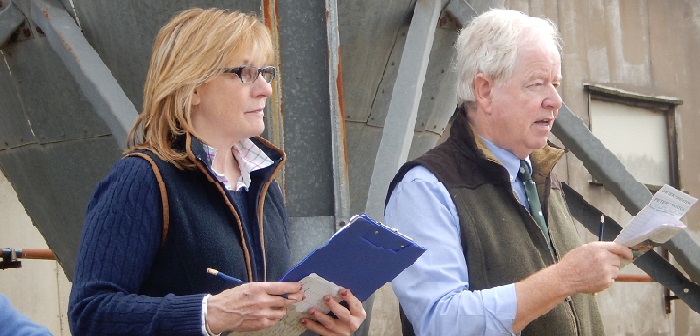Although the latest SPP dropped by another 0.53p and now stands at 112.89p/kg, spot bacon prices appear to have levelled out, with better numbers being absorbed, although no significantly higher prices are yet being paid.
This follows the trend in Germany, where prices have stood-on for six weeks in succession, with the euro ending a much quieter week, trading on Friday worth 77.85p, which is almost exactly its value a week ago.
Contract prices will, however, continue to drift downwards because of the influence of a falling SPP, but most weekly contribution prices have stayed at similar levels.
The question on most people’s lips is: when will prices actually go up, and what is there to stimulate the SPP to travel north rather than south? As it feeds off itself to some extent, it’s difficult to answer this, but an improvement in EU prices would be one way in which UK pigmeat could become more competitive against cheaper imports.
Sow prices have also remained at similar levels, with little variation on the week, and a rise in this sector would be welcome too, not only for those culling herds, but also as a more positive sign of improving EU mainland pigmeat values. Most UK cull sows remained within the 54p to 56p range.
The latest AHDB 30kg ex-farm weaner average reflected slightly firmer demand, up by £1.34 on the week to stand at £37.20/head, but the 7kg weaner average continues to display an easier trend at £29.17, down 40p/head on the week.
However, as previously mentioned, weaner values are spread across a very wide range, and for those fortunate sellers who negotiated weaner contracts last year, their prices are in some cases £4 to £6/head better than is now available on the spot market.
This is, however, a time when buyers look at the small print on weaner contracts, and those sellers with Titanic versions (that is, not watertight) shouldn’t be surprised if buyers start to back away or renegotiate.
To the dismay of our arable farming partners, feed prices are continuing to reflect similar trends, with the latest LIFFE feed wheat quotes showing March trading at £104.60/t and July at £109.15/t, but helping producers to survive what would otherwise be an unviable situation, with many feed users trading on a month-to-month basis while the market continues to drift and no clear signs are emerging of its direction in the months ahead.
Spot feed wheat is currently quoted at £100.30, up £2.50/t on the week, but protein prices are reflecting easier trends with rapemeal ex-Kent down £3 to £142 for March delivery and Brazilian soya meal slipping £4 ex-Liverpool to £257/t for March delivery.
And finally, the latest UK slaughtering statistics are still indicating the imbalance between supply and demand, with clean pig slaughterings up 2.4% on January 2015 and pigmeat production 4.1% higher over the same period.
Although imports of frozen and fresh pork to the UK reduced by 1% in volume, values have slumped by 18% when compared to December, indicating how competitive EU pigmeat has become and the downward pressure this is putting on UK prices.
Mixed messages are continuing to emerge from Europe however, with the Danish pig herd showing reductions in the number of in-pig sows and gilts. But, maiden gilt numbers are up by 10%, so there may be trouble ahead – although the rise in the numbers may be due to delays in serving them until the market settles down . . . we’ll see.




